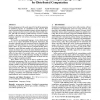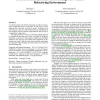1704 search results - page 26 / 341 » Design of a Concurrent and Distributed Language |
184
click to vote
ECOOPWEXCEPTION
2006
Springer
15 years 6 months ago
2006
Springer
Abstract. Exception handling is a well-established mechanism in sequential programming. Concurrency and asynchronous calls introduce the possibility for multiple simultaneous excep...
112
Voted
IM
2007
15 years 4 months ago
2007
— The objectives of this paper are twofold. First, we introduce a novel policy language, called CIM-SPL (Simple Policy Language for CIM) that complies with the CIM (Common Inform...
119
click to vote
ICFP
2005
ACM
16 years 2 months ago
2005
ACM
Existing languages provide good support for typeful programming of standalone programs. In a distributed system, however, there may be interaction between multiple instances of ma...
133
Voted
SAC
2009
ACM
15 years 9 months ago
2009
ACM
Parallel architectures are the way of the future, but are notoriously difficult to program. In addition to the low-level constructs they often present (e.g., locks, DMA, and non-...
137
click to vote
PEPM
2009
ACM
15 years 7 months ago
2009
ACM
A well-known bad code smell in refactoring and software maintenance is duplicated code, or code clones. A code clone is a code fragment that is identical or similar to another. Un...


